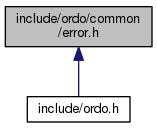|
Ordo
0.3.4
Symmetric Cryptography Library
|
|
Ordo
0.3.4
Symmetric Cryptography Library
|
Utility. More...

Go to the source code of this file.
Enumerations | |
| enum | ORDO_ERROR { ORDO_SUCCESS, ORDO_FAIL, ORDO_LEFTOVER, ORDO_KEY_LEN, ORDO_PADDING, ORDO_ARG } |
Functions | |
| ORDO_PUBLIC const char * | ordo_error_msg (int code) |
Utility.
This header exposes error codes emitted by the library. Code which uses the library should always use the explicit error codes to check for errors, with the sole exception of ORDO_SUCCESS which is guaranteed to be zero.
| enum ORDO_ERROR |
Error codes used by the library.
| Enumerator | |
|---|---|
| ORDO_SUCCESS |
The function succeeded
|
| ORDO_FAIL |
The function failed due to an external error.
|
| ORDO_LEFTOVER |
User input was left over unprocessed.
|
| ORDO_KEY_LEN |
The key length provided is invalid.
|
| ORDO_PADDING |
The padding was not recognized and decryption could not be completed.
|
| ORDO_ARG |
An invalid argument was passed to a function.
|
| ORDO_PUBLIC const char* ordo_error_msg | ( | int | code | ) |
Generates a readable error message from an error code.
| [in] | code | The error code to interpret. |
 1.8.6
1.8.6